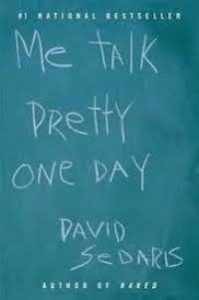For me it was last week, when I was reading Me Talk Pretty One Day by David Sedaris. I am admittedly very late to the David Sedaris game, but I’m playing catch up at a rapid pace. I read the book in a few days and decided to read some essays out loud to my partner. One four-page essay about a clogged toilet had me doubled over, laughing so hard that I couldn’t finish my sentences. My partner was laughing too, both at the essay itself and my reaction to reading it out loud. When Sedaris recounted his speech therapy sessions in elementary school and his early days of living in France, he did so with an imaginative wit that pulled me away from the scary headlines of the day or the worries of the future that filled my head. I quickly bought two more of his books to get me through another month of quarantine. Most books I read aren’t funny—I would argue they’re not even lighthearted. I recently finished Barracoon, a harrowing story by Zora Neale Hurston about the oldest living survivor of the last slave ship brought to America. More of my summer choices include: Where The Crawdads Sing, fraught with abandonment, loneliness, and murder; The Whistler by John Grisham, set in the Florida panhandle with a brutal murder as its central storyline; and The Dead Zone, a 1979 book by Stephen King with, you guessed it, lots of murder. Most books I read have some element of suspense or are full of heavy themes. I don’t naturally gravitate to funny books, but when I do I almost always find that it’s worth it. At the beginning of quarantine, my whole family read Vacationland: True Stories from Painful Beaches by John Hodgman. I read my mother a passage from a particularly funny essay about Hodgman’s horror at stumbling upon a gigantic clam while snorkeling in a lake in Maine. My dad called to describe his favorite story about Hodgman’s family moving into a new house and discovering a rodent infestation. He could barely get the words out from laughing so hard. On a road trip this past year, my sister read from Guy Branum’s book My Life as a Goddess: A Memoir Through (Un)Popular Culture. Branum, a comedian, expressed his journey towards self-acceptance in such a way that otherwise painful musings about the way he views himself became hilarious anecdotes designed to uplift. During a particularly rough time in college, I read Yes Please by Amy Poehler. “Telling me to relax or smile when I’m angry is like bringing a birthday cake into an ape sanctuary. You’re just asking to get your nose and genitals bitten off,” Poehler writes. She’s adept in writing about herself and her career in relatable ways that I couldn’t help but laugh at. At a time in my life when mostly unsolicited advice came pouring in regularly, reading career and life musings wrapped in humor was exactly what I needed. Another gem from Yes Please: “Fighting aging is like the War on Drugs. It’s expensive, does more harm than good, and has been proven to never end.” True, true, and true. Not all books that have made me laugh out loud are written by comedians. One of my earliest memories of reading a book I found hilarious was driving across Florida with my mom while I read The Princess Bride to her. (Somehow funny books are made funnier by reading them out loud.) “Mawidge is a dweam wiffin a dweam,” I read from the marriage scene, in between bouts of uncontrollable laughter. “The dweam of wuv wapped wiffin the gweater dweam of everwasting west. Eternity is our fwiend, remember that, and wuv wiw fowwow you forever.” Books that make us laugh out loud are a balm for the soul in times of crisis. Find them, enjoy them, and try your hardest to read them to your friends and family without having to stop and catch your breath.










